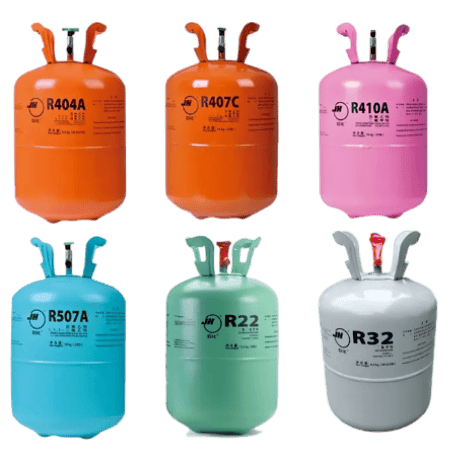When it comes to keeping our foods fresh and drinks chilled, the refrigerator is an indispensable appliance in every kitchen. At TheKitchenApplianceDad.com, we often receive queries about various aspects of kitchen appliances, and one common question is about the smell of refrigerant. This isn’t just about curiosity; it’s an important safety concern. In this detailed guide, we’ll explore what refrigerant smells like, how to identify potential leaks, and the steps to take if you suspect a refrigerant leak in your refrigerator.
Understanding Refrigerant
Before diving into the specifics of refrigerant odors, let’s clarify what refrigerant is. Refrigerant is a chemical compound used in cooling mechanisms, like those in air conditioners and refrigerators. It transitions from a liquid to a gas as it absorbs heat from the contents of your refrigerator, thereby cooling them.

Types of Refrigerants
- Chlorofluorocarbons (CFCs): Previously common but now largely phased out due to their harmful environmental effects.
- Hydrochlorofluorocarbons (HCFCs): These have also been phased out for similar reasons.
- Hydrofluorocarbons (HFCs): Currently the most commonly used refrigerants, known for having a lesser impact on the ozone layer.
- Hydrocarbons (HCs): Such as propane and isobutane, these are environmentally friendly and are increasingly used in modern refrigerators.
What Does Refrigerant Smell Like?
Interestingly, pure refrigerants are typically odorless. This characteristic makes it tricky to detect a refrigerant leak through smell alone. However, in practice, the scenario can be a bit different.
Additives and Impurities
Manufacturers often add a detectable odor to refrigerants used in industrial or commercial settings for safety reasons — much like the mercaptan added to natural gas. For residential appliances, this is less common. However, impurities and other substances mixed with the refrigerant during manufacturing or servicing can give it a noticeable odor.
Common Descriptions
While pure refrigerants are odorless, any smell associated with them typically comes from these additives or impurities. Descriptions vary widely, but some common terms used include:
- Chemical-like: A sharp, synthetic smell similar to some plastics or cleaning agents.
- Sweet and ether-like: Somewhat reminiscent of chloroform or other heavy ethers.
Detecting a Refrigerant Leak
Since refrigerants are generally odorless, detecting a leak by smell alone can be difficult. Here are some signs that might indicate a refrigerant leak:
- Presence of oil: Refrigerant oil might be present around HVAC connections or on the floor near the appliance.
- Hissing sounds: Leaking refrigerant can sometimes produce a hissing sound as it escapes from a small hole or crack.
- Poor cooling performance: If your refrigerator isn’t cooling properly, it could be due to a lack of refrigerant.
What to Do If You Suspect a Leak
- Do not ignore the issue: Refrigerant leaks can lead to inefficient appliance operation and can be environmentally harmful.
- Ventilate the area: Ensure the room is well-ventilated, as some refrigerant gases can be harmful if inhaled in concentrated amounts.
- Contact a professional: It’s essential to get a qualified technician to inspect and repair any leaks. Handling refrigerants requires special training and equipment.
Health Risks of Refrigerant Exposure
Exposure to refrigerants can pose several health risks, particularly if the exposure is prolonged or the concentration is high. Potential health effects include:
- Respiratory issues: Difficulty breathing, throat irritation, and, in severe cases, lung damage.
- Skin and eye irritation: Direct contact can cause frostbite or chemical burns.
- Neurological effects: High levels of exposure can lead to headaches, dizziness, and other neurologic symptoms.
Preventing Refrigerant Leaks
Preventive maintenance is key to avoiding refrigerant leaks. Here are some steps you can take:
- Regular servicing: Have your refrigerator serviced by a professional annually to ensure it is in good working order.
- Monitor performance: Keep an eye on your refrigerator’s cooling performance and energy usage.
- Inspect seals and hoses: Check for wear and tear on seals and hoses, which can lead to leaks over time.
Key Takeaways
- Refrigerant is typically odorless: Any smell usually comes from additives or impurities.
- Detection: Since refrigerants are generally odorless, look for signs like oil residues, hissing noises, or poor cooling performance.
- Safety first: If you suspect a refrigerant leak, ventilate the area and call a professional for repair.
- Health risks: Be aware of potential health risks associated with refrigerant exposure, including respiratory problems and skin or eye irritation.
Refrigerant leaks can be subtle yet significant issues in household appliances, particularly in refrigerators. Understanding the nature of refrigerants, their typical lack of odor, and how to detect leaks is crucial for maintaining the safety and efficiency of your appliance. Remember, regular maintenance is your best defense against refrigerant leaks, ensuring that your refrigerator continues to operate safely and effectively.


